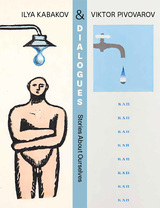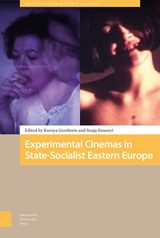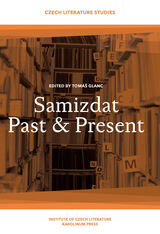3 books by Glanc, Tomáš

Dialogues
Ilya Kabakov and Viktor Pivovarov, Stories about Ourselves
Ksenia Nouril
Rutgers University Press, 2020
Artists in the Soviet Union faced a difficult choice: either join the official academies and make art that conformed to the state’s aesthetic and ideological dictates, or attempt to develop alternative artistic practices and spheres for exhibiting their work. In the early 1970s, conceptual artists Ilya Kabakov and Viktor Pivovarov chose the latter option, turning their limited resources into an asset by pioneering an entirely new artistic genre: the album. Somewhere between drawings and novels, Kabakov and Pivovarov’s albums were also the basis for unique performance pieces, as the artists invited select audiences to their Moscow apartments for private readings and viewings of the albums, helping to cultivate an alternative artistic community in the process.
This exhibition catalog brings together Kabakov and Pivovarov’s key works for the first time, putting the two artists in dialogue and recreating their artistic community. It not only includes nearly hundred pages of full-color illustrations, but also provides complete English translations of the Russian texts that appear in the volume, plus new interviews with each artist. Taken together, they give viewers a new appreciation of the different aesthetic strategies each artist used to depict the absurdities of everyday life in the Soviet era. Published in partnership with the Zimmerli Museum.
This exhibition catalog brings together Kabakov and Pivovarov’s key works for the first time, putting the two artists in dialogue and recreating their artistic community. It not only includes nearly hundred pages of full-color illustrations, but also provides complete English translations of the Russian texts that appear in the volume, plus new interviews with each artist. Taken together, they give viewers a new appreciation of the different aesthetic strategies each artist used to depict the absurdities of everyday life in the Soviet era. Published in partnership with the Zimmerli Museum.
[more]

Experimental Cinemas in State-Socialist Eastern Europe
Ksenya Gurshtein
Amsterdam University Press, 2022
Was there experimental cinema behind the Iron Curtain? What forms did experiments with film take in state socialist Eastern Europe? Who conducted them, where, how, and why? These are the questions answered in this volume, the first of its kind in any language. Bringing together scholars from different disciplines, the book offers case studies from Bulgaria, Czech Republic, former East Germany, Hungary, Poland, Romania, and former Yugoslavia. Together, these contributions demonstrate the variety of makers, production contexts, and aesthetic approaches that shaped a surprisingly robust and diverse experimental film output in the region. The book maps out the terrain of our present-day knowledge of cinematic experimentalism in Eastern Europe, suggests directions for further research, and will be of interest to scholars of film and media, art historians, cultural historians of Eastern Europe, and anyone concerned with questions of how alternative cultures emerge and function under repressive political conditions.
[more]

Samizdat Past+Present
Edited by Tomáš Glanc
Karolinum Press, 2019
Much of what we now consider the canon of twentieth-century Czech literature—the work of authors like Bohumil Hrabal, Ludvík Vaculík, and Jáchym Topol, among many others—has, in fact, just recently become widely available to readers. Long published only in censored form or in secret among political dissidents, this body of underground literature is collectively known as samizdat. Samizdat Past and Present provides an expert introduction to these writings and their history, offering insight into both the current wave of literary rediscovery and translation and contemporary debates over censorship. In a diverse array of chapters, Tomáš Glanc gathers together texts from representative figures of Czech samizdat and underground culture of the 1960s to ’80s and provides a useful comparison of Czech, Polish, and Russian samizdat. From literary historians to former samizdat publishers and writers with firsthand experience of communist censorship, secret police, fake trials, and imprisonment, the authors of Samizdat Past and Present illuminate the complexities of a literature written under censorship and the struggle for freedom of thought in a totalitarian regime.
[more]
READERS
Browse our collection.
PUBLISHERS
See BiblioVault's publisher services.
STUDENT SERVICES
Files for college accessibility offices.
UChicago Accessibility Resources
home | accessibility | search | about | contact us
BiblioVault ® 2001 - 2024
The University of Chicago Press









